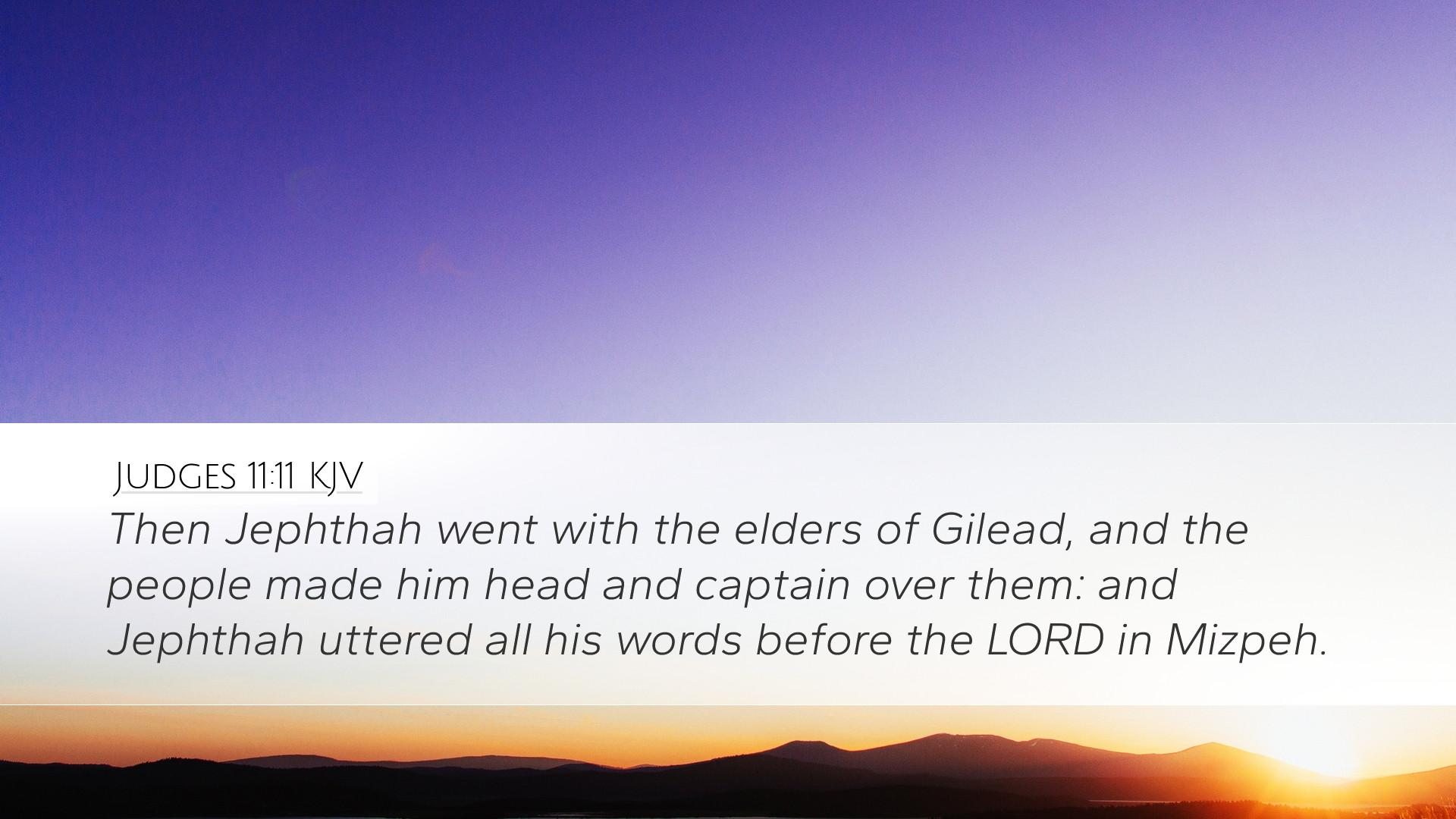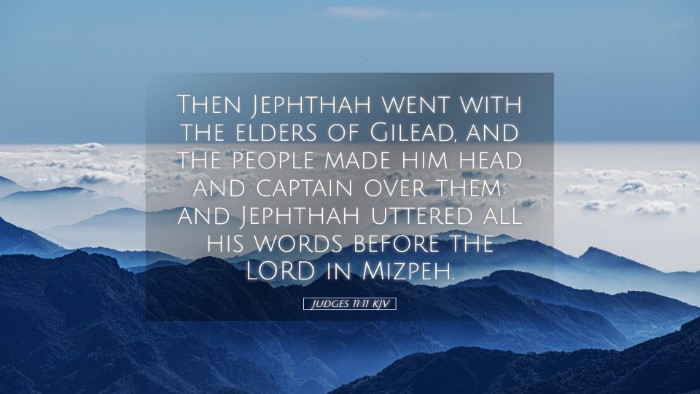Commentary on Judges 11:11
Judges 11:11 states: "Then Jephthah went with the elders of Gilead, and the people made him head and captain over them: and Jephthah uttered all his words before the Lord in Mizpeh."
Context and Introduction
The narrative of Jephthah is a vivid illustration of God's ability to use flawed individuals for His purposes. Judges 11 introduces Jephthah as a significant figure in Israel's history during a tumultuous time marked by moral decay and vulnerability to oppression from surrounding nations. The Israelites' need for deliverance sets the stage for Jephthah’s rise, emphasizing the recurring theme of divine intervention in the face of human inadequacies.
Historical and Cultural Background
Jephthah hailed from Gilead, a region strategically located east of the Jordan River. His background as the son of a harlot adds complexity to his character and leadership, reflecting the social stigmas and challenges he likely faced. The elders of Gilead's decision to appoint him signifies a moment of recognition for his capabilities despite his origins.
Exegesis of the Verse
In this verse, we observe a pivotal moment where Jephthah is accepted as a leader following an appeal to the elders of Gilead. The phrase "head and captain" indicates his dual role as both a military leader and a political figure. This was a functional necessity as Israel faced aggression from the Ammonites, and Jephthah’s unique experiences prepared him for this role.
Jephthah's act of "uttering all his words before the Lord in Mizpeh" highlights the importance of covenant and divine guidance in leadership. Mizpeh served as a significant spiritual and political site for Israel, often associated with gathering for communal decisions and invoking God’s presence in crucial matters.
Theological Insights
- Divine Sovereignty: This verse reaffirms the belief that God orchestrates events according to His divine will. Despite Jephthah's tumultuous beginnings, God raises him to lead His people.
- The Power of Leadership: Jephthah's leadership is a reminder of God's ability to empower individuals regardless of their past, urging contemporary leaders to rely on divine strength and guidance.
- Importance of Community and Counsel: The elders’ role in recognizing Jephthah mirrors the necessity of community discernment in leadership selection, illustrating the value in seeking wise counsel.
- Spiritual Accountability: Jephthah's actions in offering his words to the Lord before leading further highlight the required spiritual accountability for leaders in fulfilling their roles.
Reflections on Leadership
The narrative provides profound lessons concerning the qualities expected of leaders. Jephthah’s past should serve as an encouragement that no one is disqualified from God’s service due to their history, thus inviting reflection on how churches today view leadership potential.
Moreover, Jephthah’s submission to God’s will, shown through his prayer and dedication, conveys a foundational principle for all leaders: the necessity of divine reliance over personal ambition. His story exemplifies the tension between human agency and divine providence, challenging modern readers to trust in God’s plan amidst uncertainty.
Lessons for Today
- Hope for the Marginalized: Jephthah’s story is emblematic of hope for those who feel marginalized or unworthy, assuring them of their potential to fulfill God’s purposes.
- Call to Responsibility: The biblical account prompts current leaders to be responsible stewards of their positions, seeking divine guidance in their decisions, and remaining accountable for their actions.
- Covenantal Living: Jephthah's dedication to the Lord emphasizes the call for believers to engage in covenantal relationships with God, approaching leadership and life with a heart oriented toward divine will.
Conclusion
Judges 11:11 provides a multifaceted understanding of leadership through the profound character of Jephthah. His story invites reflection not only on the nature of human leadership but also on God's sovereignty and grace. As contemporary readers, the challenge remains to discern how God might be calling us to lead in our respective contexts, always reminding us of His unyielding capacity to transform lives and circumstances for His glory.


